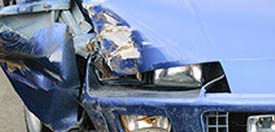 |
Ouch! Better make sure you know what your auto insurance policy covers.... |
Many
drivers who walk away from a car accident with no major injuries may still develop
a serious headache after finding out that their auto insurance policy doesn’t
cover as much as they thought it would. But, some of the most common problems
can be avoided simply by knowing more about what your auto insurance policy covers
before you have an accident, according to the Insurance Information Institute
(I.I.I.).
For
example, the I.I.I. says insured drivers often don’t realize that their auto insurance does not
automatically cover the cost of a replacement rental car until after they’ve
had an accident. Since the average car is in the repair shop for two weeks after
an accident, these drivers can end up spending as much as $500 to rent a replacement
car. But, other insured drivers pay little or nothing to rent a car because their
policies include an inexpensive but often overlooked option known as rental reimbursement.
To help
insured drivers increase satisfaction with the auto insurance claims process,
I.I.I. is working with the Consumer Protection Association of America on a nationwide
public information campaign entitled, “Wiser
Drivers Wise Up.” The campaign is designed to educate drivers that being
satisfied with what your insurance policy covers depends on what you know before
you have an accident.
Drivers
who think they won’t have a car accident because they are good drivers need
to think again. Just ask Emily O. of Alexandria, Va., whose car sustained
$2,000 in damages while it was parked in front of her home when a tree branch
fell during a light rain, smashing the hood and shattering the windshield.
“My insurance policy had to cover the damages even though the accident clearly
wasn’t my fault. Fortunately, my coverage included rental reimbursement,
so I was able to go about my daily routine while my car was being repaired without
paying anything extra for a rental car,” she said.
“Rental
reimbursement coverage is available for only a couple of dollars a month with
almost every auto insurance policy, but it is bypassed too frequently by those
who believe they will not have a car accident or those shopping only for the lowest
cost premium,” said Ray Bruce, president of the Consumer Protection Association
of America. “The cost of a rental replacement car adds up fast. Even if you
don’t have an accident for eight or nine years, the coverage pays for itself
when you need it most.”
Unfortunately, many drivers don’t think about their insurance coverage until after they have an accident and call their insurance company to file a claim to help pay for car repairs, a rental car and other expenses.
“Many of our customers come to us because they need a replacement rental car immediately after an accident, and very often they are surprised to find that their auto insurance doesn’t automatically cover the cost of the rental,” said Jeff Brummett, vice president of Enterprise Rent-A-Car. “They end up having to spend their own money to rent a car that could have cost them little or nothing if they had rental reimbursement coverage.”
The I.I.I. adds that sometimes working out the details of the claim with the auto insurance company can take time. Even if the accident is the other driver’s fault, you may have to wait several days or longer to get the other insurance company to agree to provide you with a rental car or reimburse your rental car expense. With your own coverage, there is no waiting.
According to Jack Billington, a retired insurance claims executive, having a policy that covers the cost of a replacement rental car has a lot to do with how satisfied a vehicle owner is with the overall claims experience. As spokesperson for the Wiser Drivers campaign, he suggests the following tips to help vehicle owners have a better experience with insurance companies and repair facilities:
-
Do business only with a reputable company. Obtain insurance fromcompanies, independent brokers or direct marketers that have a proven track record of handling auto insurance claims effectively. Get a referral or contact your local Better Business Bureau or State Department of Insurance.
-
Report a car accident from the scene, if possible. If your car is not drivable, your agentor claims centermay be able to save you time and money by having the car towed directly to the repairfacility insteadofto a temporary storage facility.In addition, arrangements may be made immediately to provide you with a replacement rental car, if your policy includes this coverage.
-
Know what your insurance covers. The whole insurance hassle will be less painful following your accident if you’re already familiar with the details of your coverage. For example, don’t wait to find out until after an accident that your policy doesn’t automatically cover costs for emergency roadside assistance or a replacement rental car. Read your policy to check for specifics before you are involved in an accident.
-
Know what your deductible is and any other additional charges before authorizing work. Expect your insurance adjuster, claims representative or repair facility appraiser to review the damage with you and explain the repair process, including the use of original or generic auto parts. Before authorizing repairs, know what your deductible is, as well as any additional charges you will be expected to pay once repairs are complete.
-
Ask about warranties on repairs. Ask whether your insurer has a repair facility referral program that offers a written limited or lifetime repair warranty backed both by the repairer and insurer for as long as youown your vehicle.
-
Read your policy. Remember to read your auto insurance policy or talk to your insurance agent once a year to see if your policy needs to be updated. As your needs change, your coverage may also need to be adjusted.
The Insurance Information Institute (www.iii.org) is a non-profit, communications organization supported by the property/casualty insurance industry.